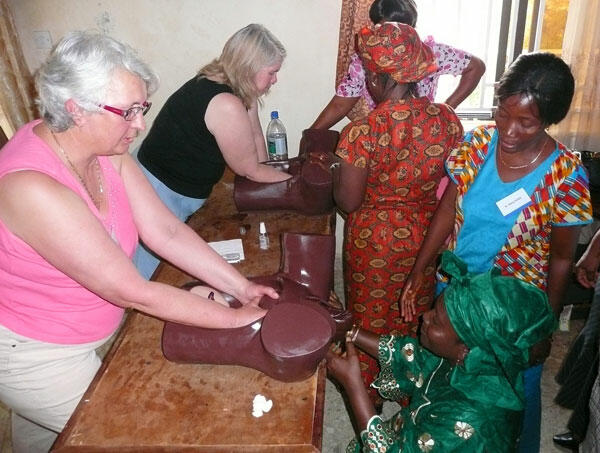
On Tuesday 7 December 2010, maternal health professionals from Africa and Asia will be attending a workshop in Liverpool to discuss the effects of ‘Making It Happen’, a programme with a life-saving training package for health care providers at its heart. Participants will share successes and lessons learned from this maternal and newborn health intervention, to better determine how the programme can be scaled-up.
Supported by the UK’s Department for International Development (DFID), UNICEF and other bodies and in partnership with the Royal College of Obstetricians & Gynaecologists (RCOG), the Making It Happen programme is evaluating the effect of this intervention on reducing maternal and newborn mortality and morbidity in five countries - Kenya, Sierra Leone, Zimbabwe, Bangladesh and India. Representatives from those countries, alongside DFID and RCOG will be visiting Liverpool School of Tropical Medicine (LSTM) to develop future strategies for reducing maternal and newborn deaths within those countries.
The availability and quality of Essential (Emergency) Obstetric and Newborn Care (EOC & NC) both demonstrably increased by delivering this country-adapted competency-based training package to healthcare providers of different cadres. Working together with many volunteer staff retired from or still working in the NHS, the Making it Happen programme is delivering a sustainable intervention by ensuring there are Master Trainers or Facilitators in each country as well as Supportive Supervisors who help implement changes within the workplace.
Since piloting the training package in 2007, almost 3000 health care providers have been trained through the LSTM team, leading to improved knowledge and skills that result in a better quality of clinical practice: notably improved care of women with eclampsia; better monitoring of labour; improved resuscitation of the baby; improved ability to deliver twins and breech presentations; improved management of haemorrhage and upskilling of, for example, midwives who are now able to perform procedures previously restricted to doctors.
Head of LSTM’s Maternal and Newborn Health Unit and Principal Investigator Dr Nynke van den Broek said: “A renewed focus on supporting health care porviders of all levels to give truly Skilled Birth Attendance and manage obstetric emergencies correctly is saving lives of both mothers and babies in each of the countries involved in the Making it Happen programme and ensures that this crucial health care is available to all women 24 hours a day.”
Professor James Walker, Senior Vice-President of RCOG said: “The RCOG is proud to be part of this programme where so many of its Fellows and Members volunteer so readily. The training provided helps the local healthcare providers to increase both the capacity and sustainability of high level care where it is so desperately needed. The success of the programme is due to the combination of dedication of all the country partners, the willingness of the volunteers and the keenness of the participants.”
-ends-
For further information, please contact:
Billy Dean, Development Officer
Office: +44 (0)151 705 3272
Notes to Editors
Liverpool School of Tropical Medicine
LSTM is a multi-disciplinary organisation concerned with research, teaching, technical assistance and clinical care in the fields of tropical and infectious diseases. Founded in 1898, LSTM has been at the forefront of the fight against infectious, debilitating and disabling diseases for more than a hundred years and continues that tradition today with a research portfolio in excess of £159 million and a teaching programme attracting students from over 70 countries.
Royal College of Obstetricians & Gynaecologists (RCOG)
The RCOG encourages the study and advancement of the science and practice of obstetrics and gynaecology. We do this through postgraduate medical education and training development, and the publication of clinical guidelines and reports on aspects of the specialty and service provision. The RCOG International Office works with other international organisations to help lower maternal morbidity and mortality in under-resourced countries.